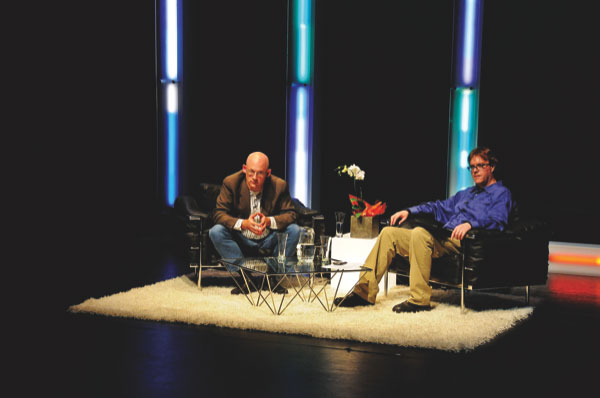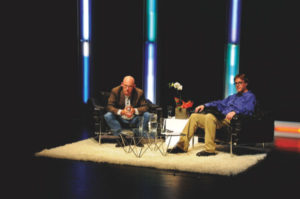Ernest Reid
Science and Technology Editor
The lolcat meme is a problem for internet evangelists.
People can argue the internet will change the world, professor Clay Shirky says, but how do you justify the explosion of funny, but shallow, pictures of cats?
Everyone knows lolcats will not be on the list of the century’s great greatest achievements. Among other candidates, Shirky says, they are the stupidest possible creative act.
But making a lolcat is still a creative act and for Shirky, they represent the “cognitive surplus” our society has in the 21st century.
Shirky talked about this idea in his 2010 book Cognitive Surplus. The New York University professor and network design consultant spoke about his book at this year’s International Festival of Authors at the Harbourfront Centre. The talk was part of the McLuhan100 centenary celebration.
The cognitive surplus, he says, is made up of the free time that each of us can apply to causes. Technology has allowed our free time and our individual decisions to accumulate collectively.
How much free time do we have? Shirky looked at how much time has gone into the Wikipedia project. Collectively, all of Wikipedia in all languages had taken 100 million hours by 2008.
To put this in context, North Americans currently watch 200 billion hours of television per year. Collectively, Shirky argues, the whole world has over a trillion free hours a year.
“The 10-year history of Wikipedia is a rounding error to the cumulative free time we all have,” the professor explains. “In North America, we spend a Wikipedia’s worth of free time every weekend just watching ads.”
This doesn’t mean everyone will stop watching television and start editing Wikipedia, Shirky clarifies, but it means very small changes in people’s behaviours can accumulate into very large social changes.
Most of the cognitive surplus goes towards things that amuse our friends.
People don’t create and send funny pictures because they think it will create a better place, he says, but because they’ll make people laugh.
This always happens with the introduction of new media.
After the printing press was invented, it didn’t take long for the first erotic novel to be printed in Venice.
“It took people 150 years to even think of the scientific journal,” Shirky says.
Europeans needed time to harness printing press technology in a culture-changing way. Peer review, published results, and interpretable data created a complete inversion of a culture of alchemy based on the individual, internal, and private.
Like 15th century Europeans, web users need time to harness the internet’s power properly.
“We get lolcats because the web is the kind of medium it is and we’re the kind of people we are,” Shirky assures.
Even though lolcats are the stupidest creative act, they represent a “gateway drug to participation” and to other kinds of creating.
Lolcats, Shirky believes, represents the moment when someone crosses over and takes advantage of the possibilities of the internet.
Making even one lolcat crosses the gulf between doing something and doing nothing.
This doesn’t mean making a lolcat picture transforms users into Wikipedia editors, Shirky argues, but it means people are using their devices to create and share.
This is what separates the last decade from those before it. The world is do-it-yourself now. People can consume, but also produce and share. It turns out, continues Shirky, that people like all three of these activities and not just one.
People are consuming, producing, and sharing on platforms no one’s encountered before.
But is Facebook like other media? Or if it is social, is Facebook like the real world in the digital realm? These are the wrong questions, Shirky says.
“Facebook is like Facebook,” he says, and it’s different from anything else.
Social networking takes familiar social settings and lets them function at such a huge scale that they become unfamiliar.
There is no way to get out of this situation with metaphor, Shirky warns us; there is no way to say Facebook is like something else.
“We have to grapple through these situations completely.”
Luckily, we’re the generation to do it.
“We are the ones creating the cultural norms around the new medium,” Shirky says. What our generation has to figure out, he goes on, is what are the uses of the internet that will make the world a better place.
The lolcat meme represents the very beginning of that process.
With files from TED





